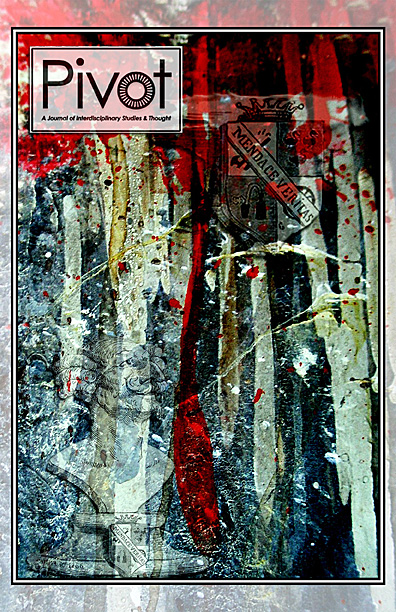Power by Deception: Mamet’s Matters of Confidence
DOI:
https://doi.org/10.25071/2369-7326.32158Abstract
This essay addresses David Mamet’s ambivalent attitude towards deception along the cases of his play The Shawl (1985) and his film House of Games (1987) – two works revolving round and structured as a con game. Based on the reasoning that the con man, like the dramatist, capitalizes on language’s power to connect and confuse, my argument seeks to establish dramatic deception as an engine of reflection. Moreover, given Mamet’s idiosyncratic, almost didactic rejection of a clear, agonistic division between winner and loser, true and false, good and evil, the concept of deceit itself can be tentatively repurposed from pejorative product to productive process by shifting focus from morality to machination. Ultimately, this should produce a frame of assent capable of integrating diversity, processing morality, and stimulating reflexivity.
References
Borden, Diane M. Man Without a Gun: Mamet, Masculinity, and Mystification. Gender and Genre: Essays on David Mamet. Eds. Christopher C. Hudgins and Leslie Kane. New York: Palgrave, 2001. 235-54. Print.
Brewer, Gaylord. Mamet‘s Divided Magics: Communion and Duplicity in The Shawl, The Cryptogram and Other Works. American Drama 14.2 (Summer 2005): 16-38. Print.
Callens, Johan. David Mamet. Post-War Literatures in English: A Lexicon of Contemporary Authors. Vol.58. Nijmegen: MartinusNijhoff, 2000. 1-21. Print.
Carroll, Dennis. David Mamet. Basingstoke: Macmillan, 1987. Print.
Dean, Anne. David Mamet: Language as Dramatic Action. London: Associated UP, 1990. Print.
Deleuze, Gilles. Cinéma 1: L‘image-mouvement. Paris: Minuit, 1983. Print.
Epictetus. Discourses, Book 1. Trans. and introd. Robert F. Dobbin. Oxford: Clarendon, 1998. Print.
Farb, Peter. Word Play: What Happens When People Talk. New York: Walter A. Knopf, 1974. Print.
Foucault, Michel. The Subject and Power. Art after Modernism: Rethinking Representation. Ed. and introd. Brian Wallis. New York: Museum of Contemporary Art, 1984. 417-32. Print.
Geis, Deborah R. Postmodern Theatric(k)s: Monologue in Contemporary American Drama. Ann Arbor: U of Michigan P, 1995. Print.
Holthusen, Hans Egon. Dramaturgie der Verfremdung. ModerneDramentheorie. Eds. Aloysius van Kesteren and HertaSchmid. Kronberg: Scriptor, 1975. 143-66. Print.
Isaacs, Jeremy. Face to Face.‖1998. David Mamet in Conversation. Ed. Leslie Kane. Ann Arbor: U of Michigan P, 2001. 211-25. Print.
Kane, Leslie. Interview with Gregory Mosher. David Mamet: A Casebook. Ed. Leslie Kane. New York: Garland, 1992. 231-47. Print.
Kattenbelt, Chiel. Theatre as the Art of the Performer and the Stage of Intermediality. Intermediality in Theatre and Performance. Eds. Freda Chapple and Chiel Kattenbelt. Amsterdam: Rodopi, 2006. 29-39. Print.
King, Thomas L. Talk and Dramatic Action in American Buffalo. Modern Drama 34 (Winter 1991): 538-48. Print. DOI: https://doi.org/10.3138/md.34.4.538
Kroll, Jack. The Profane Poetry of David Mamet. Newsweek 19 Oct. 1987: 85. Print.
LaPalma, Marina de Bellagente. Driving Doctor Ford. Literature/Film Quarterly 24.1 (Spring 1996): 57-62. Print.
Lavender, Andrew. Mise en Scène: Hypermediacy and the Sensorium. Intermediality in Theatre and Performance. Eds. Freda Chapple and ChielKattenbelt. Amsterdam: Rodopi, 2006. 55-66. Print.
Mamet, David. Confession. Forward 11 Nov. 2005. n.p. Print.
Mamet, David. House of Games: A Screenplay by David Mamet. New York: Grove, 1987. Print.
Mamet, David. House of Games. Screenplay and Dir. David Mamet. Orion Pictures, 1987. Film.
Mamet, David. The Shawl. 1985. Plays: Glengarry Glen Ross; Prairie du Chien; The Shawl; Speed-the-Plow. Vol. 3. London: Methuen, 1996. 87-118. Print.
Mamet, David. Some Freaks. 1989. A Whore‘s Profession: Notes and Essays. London: Faber and Faber, 1994. 225-339. Print.
Mamet, David. South of the Northeast Kingdom. Washington: National Geographic, 2002. Print.
Mamet, David. Speed-the-Plow. Plays: Glengarry Glen Ross; Prairie du Chien; The Shawl; Speed-the-Plow. Vol. 3. London: Methuen, 1996. 119-84. Print.
Mamet, David. Three Uses of the Knife: On the Nature and Purpose of Drama. 1998. London: Methuen, 2002. Print.
Mamet, David. True and False: Heresy and Common Sense for the Actor. London: Faber and Faber, 1998. Print.
Nadel, Ira. David Mamet: A Life in the Theatre. New York: Palgrave Macmillan, 2008. Print. DOI: https://doi.org/10.1007/978-0-230-37872-8
Nuwer, Hank. A Matter of Perception. 1985.David Mamet in Conversation, Ed. Leslie Kane. Ann Arbor: U of Michigan P, 2001. 54-9.Print.
Pavis, Patrice. A Possible Definition of Semiology. 1980. Trans. Susan Basnett-McGuire. Languages of the Stage: Essays in the Semiology of the Theatre. New York: Performing Arts Journal Publications, 1982. 11-21. Print.
Petrey, Sandy. Speech Acts and Literary Theory. New York: Routledge, 1990. Print.
Price, Steven. Disguise in Love: Gender and Desire in House of Games and Speed-the-Plow. Gender and Genre: Essays on David Mamet. Eds. Christopher C. Hudgins and Leslie Kane. New York: Palgrave, 2001. 41-59. Print.
Ryan, Marie-Laure. Avatars of Story. Minneapolis: U of Minnesota P, 2006. Print.
Stam, Robert. Beyond Fidelity: The Dialogics of Adaptation. Film Adaptation. Ed. and introd. James Naremore. London: Athlone, 2000. 54-76. Print.
Turner, Victor. Dramas, Fields, and Metaphors. Ithaca: Cornell UP, 1975. Print.
Wetzsteon, Ross. David Mamet: Remember That Name. 1976. David Mamet in Conversation. Ed. Leslie Kane. Ann Arbor: U of Michigan P, 2001. 9-15. Print.


